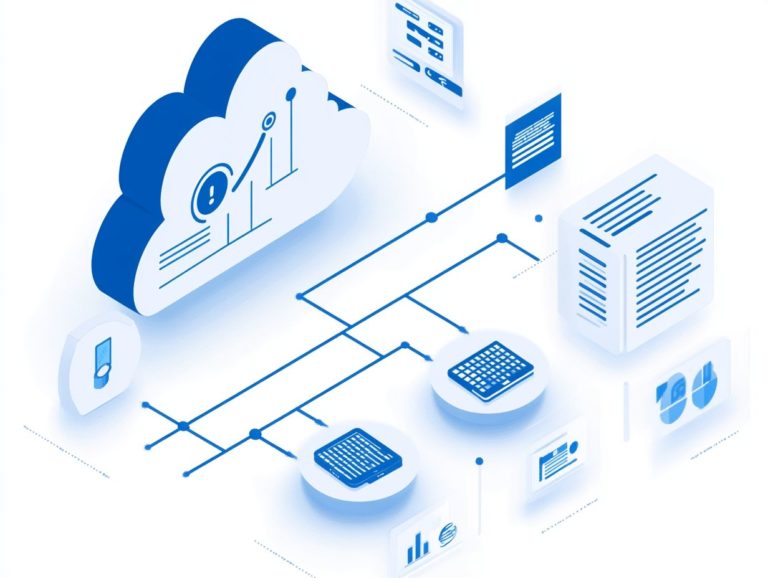How to Evaluate Cloud Security Vendors
In today s digital landscape, selecting the right cloud security vendor is paramount for protecting your organization’s sensitive data.
With countless options at your disposal, it s easy to feel overwhelmed when trying to identify which provider aligns with your security requirements.
This article outlines the key factors to consider, such as security features, reputation, cost, and flexibility.
It also highlights key questions to pose to potential vendors and outlines best practices for conducting comprehensive evaluations.
By the end, you’ll be ready to make a confident choice that protects your assets!
Contents
- Key Takeaways:
- Factors to Consider When Evaluating Cloud Security Vendors
- Questions to Ask when Evaluating Cloud Security Vendors
- Best Practices for Evaluating Cloud Security Vendors
- Frequently Asked Questions
- What is a cloud security vendor?
- Why is it important to evaluate cloud security vendors?
- What factors should I consider when evaluating cloud security vendors?
- How do I determine the reliability of a cloud security vendor?
- Do cloud security vendors offer customizable solutions?
- How do I compare and choose between different cloud security vendors?
Key Takeaways:

Consider evaluating a cloud security vendor’s features, reputation, and cost to determine their capabilities in protecting your data.
Ask specific questions about security measures, data protection, and disaster recovery plans to assess a vendor’s level of protection.
Follow best practices such as researching and comparing options, requesting and reviewing references, and considering a trial period when evaluating cloud security vendors.
What are Cloud Security Vendors?
Cloud security vendors are specialized entities that offer comprehensive security solutions tailored for cloud environments. They ensure your sensitive data remains protected while you leverage platforms like AWS, Microsoft Azure, and Google Cloud Platform.
These vendors implement important security steps, such as data encryption (scrambling your information to keep it safe), access controls, identity management, and compliance reporting. All of these are designed to shield your customer data from emerging threats like data breaches and unauthorized access.
Their role extends beyond mere technology implementation; they also set up strong governance frameworks that ensure accountability and effective risk management practices are firmly in place.
By adhering to internationally recognized standards like ISO 27001, they assist you in maintaining a structured approach to managing sensitive information. Compliance with regulations such as GDPR not only safeguards your data but also fosters trust with your customers, underscoring your commitment to data privacy and security.
Through continuous monitoring and timely updates, these vendors are pivotal in shaping a safe and resilient cloud infrastructure that can seamlessly adapt to evolving threats.
Factors to Consider When Evaluating Cloud Security Vendors
When evaluating cloud security vendors, it’s essential to consider a range of factors that will determine the effectiveness and reliability of their services. For guidance on this process, check out how to evaluate cloud vendors to ensure they can safeguard your cloud environment effectively.
Key aspects to focus on include:
- Consider security features
- Consider regulatory compliance
- Consider audit trails
- Consider the vendor’s proven track record in navigating security challenges
These elements are critical in ensuring the protection of your sensitive data.
Security Features and Capabilities
When evaluating cloud security vendors, you’ll find that security features and capabilities are foundational elements that directly influence the protection of sensitive customer data.
Essential features such as data encryption, robust access controls, multi-factor authentication, and compliance with established security protocols are crucial for building a secure cloud infrastructure.
You ll notice that cloud providers often employ data isolation techniques, ensuring that sensitive information remains distinct from other tenants even in shared environments.
Network segmentation is another vital aspect, enabling businesses to restrict data access based on user roles and organizational needs.
Regular security audits are key to validating compliance with industry standards like SOC 2 or HIPAA. These audits ensure that vendors consistently monitor their security practices and maintain alignment with regulatory requirements.
By leveraging these security components, you can significantly enhance your risk management strategies and protect against potential data breaches.
Reputation and Track Record
The reputation and track record of a cloud security vendor are crucial for protecting your sensitive data. A vendor s history in addressing security challenges shows their competence.
This credibility builds trust and strengthens their position in the market.
For instance, consider a well-known cloud provider that faced a data breach. Instead of hiding, they communicated transparently, informing clients and detailing their remediation steps.
This proactive approach not only mitigated immediate fallout but also strengthened customer relationships.
Another example is a vendor that regularly undergoes third-party assessments. They use insights from these audits to improve their security protocols.
Such initiatives foster a culture of accountability, making security a priority.
Cost and Flexibility

Cost and flexibility are key factors when choosing a cloud security vendor. They can significantly impact your organization s cloud strategy.
By understanding pricing models and service agreements, you can make decisions that maximize your cloud investment.
Many vendors offer various pricing structures, including pay-as-you-go and subscription-based options.
Each is designed to meet different needs and budgets.
Flexible contracts allow you to adjust resources based on changing requirements, minimizing costs.
This adaptability enables quick responses to market changes and enhances your potential return on investment.
Questions to Ask when Evaluating Cloud Security Vendors
When assessing cloud security vendors, ask the right questions to ensure alignment with your security needs.
Inquire about their security measures, data protection methods, and disaster recovery plans.
What Security Measures are in Place?
Understanding security measures is vital when evaluating a vendor.
Key security measures to watch for include data encryption, access controls, multi-factor authentication, and intrusion detection systems.
These elements work together to create a strong defense against unauthorized access.
Data encryption keeps your information secure during transfer and storage.
Access controls limit user permissions, reinforcing the principle of least privilege.
Multi-factor authentication requires more than just a password, adding extra protection.
Intrusion detection systems monitor network traffic for unusual activity, quickly identifying threats.
Remember, security is a shared responsibility. Engage actively in maintaining these measures and promote security awareness within your organization.
How is Data Protected?
The methods you use to protect data within a cloud environment are essential for ensuring data privacy and compliance with regulations.
This encompasses techniques such as data encryption, secure access protocols, and robust logging practices that allow you to monitor and respond to potential security incidents.
Cloud vendors implement complete security frameworks that align with industry standards like ISO 27001 and NIST.
These frameworks offer structured processes for risk management and incident response, ensuring compliance with regional regulations such as GDPR or HIPAA.
You must carefully evaluate how these strategies work together with your own security policies.
By fostering a holistic approach to data protection and establishing clear communication between your cloud service providers and internal teams, you can create a resilient security posture that safeguards critical data and builds trust with customers and stakeholders.
What is the Disaster Recovery Plan?
A well-defined disaster recovery plan is critical for you as a cloud security vendor.
This plan should outline detailed backup processes and procedures for restoring critical services, helping to minimize downtime and data loss.
Key components include recovery time objectives (RTO), which is how quickly you need to get your systems back up and running after an issue, and recovery point objectives (RPO), which indicates how much data loss you can tolerate.
Understanding your approach to risk management involves identifying, assessing, and prioritizing risks tied to potential disasters.
Regularly testing your disaster recovery strategy is vital to uncover vulnerabilities and ensure that everyone in your organization knows the protocols.
It s essential to update your plan regularly to adapt to changing technology and business requirements, maintaining effective operational resilience.
Best Practices for Evaluating Cloud Security Vendors

Get ready to empower your decision-making! Implementing best practices in evaluating cloud security vendors can elevate your selection process.
This entails conducting comprehensive research, comparing various options, and assessing potential vendors capabilities through a trial period.
By following this approach, you’ll be positioned for informed decisions that align with your organization’s needs.
Research and Compare Options
Thorough research and comparison of cloud security vendors are essential steps in pinpointing the ideal match for your organization s security needs.
By evaluating each vendor s strengths and weaknesses along with their strategies for tackling security challenges you can make well-informed decisions.
Along with examining individual features and pricing structures, consider leveraging online reviews and consulting industry reports to assess the reputation of potential vendors.
Analyzing case studies can provide insights into how these vendors have effectively addressed security issues in other organizations.
It s equally important to compare vendor certifications like ISO 27001 and SOC 2, as these credentials reflect a commitment to rigorous security standards.
A comprehensive approach to vendor evaluation can significantly bolster your confidence throughout the selection process.
Don’t wait until it’s too late. Act now to secure your data!
Consider a Trial Period
Considering a trial period with potential cloud security vendors allows you to evaluate their solutions in real-world scenarios. This provides invaluable insights into how well they work and their security capabilities.
This hands-on experience can reveal how responsive the vendor is to security incidents and the overall quality of their service. Trial periods enable you to assess user experience firsthand, ensuring that the solutions integrate seamlessly with your existing systems.
This level of scrutiny helps you determine not only technical compatibility but also ease of use for your employees. Establishing clear expectations and metrics for this evaluation process is essential.
By doing so, you can identify whether a vendor meets your specific operational needs and security standards. Clearly defining your success criteria sets you up for a knowledge-based decision-making process that can enhance your security posture significantly.
Frequently Asked Questions
This section addresses common questions about cloud security vendors to help you make informed decisions.
What is a cloud security vendor?
A cloud security vendor is a company that provides security services and products specifically designed for cloud-based environments. These vendors offer solutions to protect data, applications, and infrastructure hosted in the cloud.
Why is it important to evaluate cloud security vendors?

Evaluating cloud security vendors is crucial because it helps ensure you choose the right vendor for your organization’s needs. It allows you to assess the vendor’s capabilities, expertise, and reputation to ensure your cloud environment is secure and compliant.
What factors should I consider when evaluating cloud security vendors?
Key factors to consider include their experience and track record in the industry, the range of services and solutions they offer, and their compliance certifications (which show they meet industry standards). Also, review their data security and privacy policies.
Don t forget to check their pricing models this can make a big difference! Customer support options are also essential to consider.
How do I determine the reliability of a cloud security vendor?
You can determine the reliability of a cloud security vendor by researching customer reviews and ratings. Look into their partnerships and alliances with other reputable organizations.
You can also ask for references from their current or past clients to get a better understanding of their reliability.
Do cloud security vendors offer customizable solutions?
Yes, most cloud security vendors offer customizable solutions to meet the unique needs and requirements of their clients. These solutions can be tailored to your organization’s size, industry, and specific security concerns.
It s important to communicate your needs clearly to the vendor to ensure they can provide a suitable solution.
How do I compare and choose between different cloud security vendors?
To compare and choose between different vendors, create a checklist of your organization’s requirements and evaluate each vendor against those criteria. You can also request demos or trials of their services to get a better understanding of their offerings and capabilities.
Additionally, consulting with industry experts or seeking recommendations from other organizations in your network can be very helpful.






